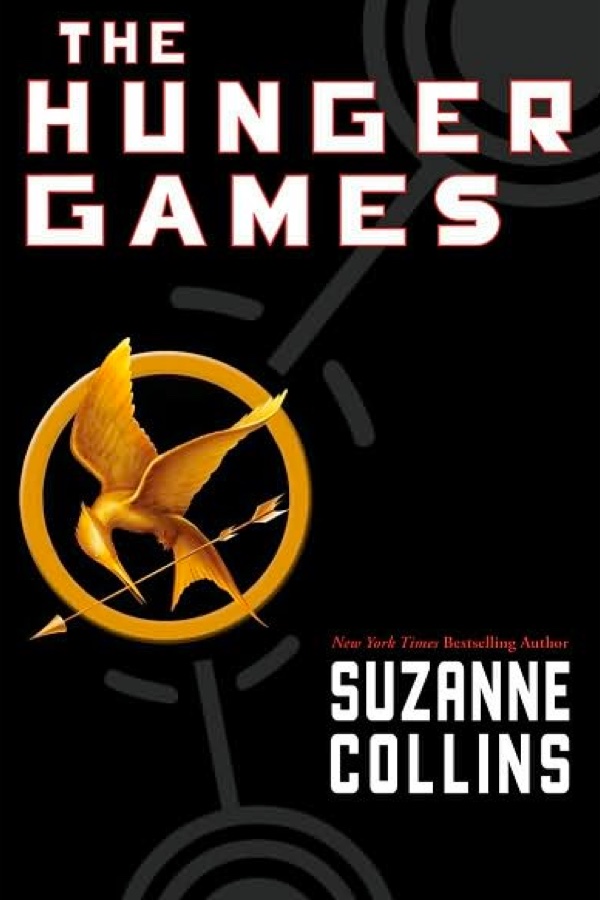The Hunger Games, the first installment of a trilogy by Suzanne Collins, appears to raise profound questions about group violence, the angst of youth, and the power of love, but, unfortunately, the well-written book becomes a victim of its own entertainment value.
Fatherless on both a personal and political level, Katniss Everdeen, as her first name seems to suggest, has been rendered hard on the outside, but soft on the inside. She’s “not the forgiving type”, in her own words, and yet “kind people have a way of working inside [her] and rooting there.” For years Katniss has been her family’s primary breadwinner, hunting illegally in the woods outside District 12. It is a credit to Collins’ writing that she is able to make a sixteen-year-old bow-and-arrow wielding adolescent believable and interesting as the strong but wounded protagonist who will do the right thing for her family. When the nefarious Capitol holds a “reaping” to collect two children from District 12 for the annual Hunger Games, Katniss makes a bold move to sacrifice herself for another. This act of love momentarily inspires a collective act of courage from the forcibly assembled crowd, who are normally too browbeaten and terrified to stand up to the established system of violence. When the lottery randomly selects a kind, quiet man from Katniss’ past as her male counterpart for the games, the stage has been set for a story about true love conquering a system of violence. Sadly, this doesn’t really happen.
In so many places the story makes an implicit promise to address big questions, and then fails to deliver. A character with a biblical sounding name performs an act of mercy, giving bread to the hungry, and later states his intention to defy the Capitol by refusing to play the game their way. Unfortunately, this same character kills a wounded opponent as part of a broader strategy to protect Katniss, and yet the matter is never brought up again. Moreover, his motivations turn out to be mostly romantic, so that the apparent theme of self-sacrificial love conquering systematic violence is gradually forced out by a saccharine romance between two characters, determined to at least play the game on their own terms. It will not be a transcendent and surprising act of pure love that allows the main characters to beat the Capitol, but a far less noble act, one motivated by fear as much as by love, and one which is ultimately selfish.
The book’s violence would be more forgivable if it were answered with a true remedy, but instead, the violence itself becomes part of the entertainment. That entertainment comes as part of a package with lavish descriptions of clothing, makeup, food, and showering facilities, and a general feel of Rome-like decadence, not to mention increasingly ridiculous technology, much of which seems too ready-made and magical to be part of a coherent sci-fi world. It’s enough to make the reader wonder if this might all turn out to be a young woman’s nightmare about the angst of high school: being forced to enter a kill-or-be-killed arena, while smiling and looking pretty. Indeed, the book’s tone and content, is mostly calculated to appeal to young ladies, violence notwithstanding. Scenes of dressing, being pampered, showering, and bathing sprinkle the book, and on about seven occasions, the plot calls for Katniss to be nude. None of these scenes are explicitly sexual in a technical sense, and young women are not likely to be fazed by most. However, it would be impossible for a young man to read these scenes in the same neutral way, and by the end it is obvious that the author is having her fun with the audience, repeatedly stepping on the invisible line of sex, without quite crossing it. As Katniss ironically states, “Naked bodies are no big deal in the arena, right?”
All of these factors taken together mean that the book is not a particularly edifying one, especially for a young man. There are certainly some positive elements, such as Katniss’ explicit recognition that the purpose of romance and marriage is to bring forth children in a family, and also the themes raised early on about love defeating violence. While allowing the possibility that the book’s sequels—to be reviewed in the near future— may elevate the tone and answer the problems here raised, this first installment fails to break out of its own arena, and the reader, expecting substance, is left hungry.
Questions to Ask
- In a kill-or-be-killed scenario, does deliberately taking the life of another human being who is not actively attacking you become morally acceptable? Can Peeta be excused for his actions when he was with the Careers, since he had good motivations?
- Why do you suppose the author never shows Katniss initiating violence against her opponents?
- We know which character has greater romantic interest in the other. Which character had purer love? Is there a distinction between pure love, and romantic love? If so, what does it take to purify a romantic love so that it stays romantic, but becomes pure as well?
- What seemed most believable, or true to life about the story, and why?
- What seemed most unbelievable or silly, and why?



